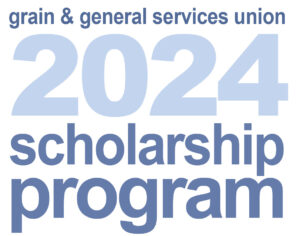
Grain and General Services Union Bursary
The Grain Services Union Bursary was established in 1998 to reflect their commitment in support of post-secondary education for Aboriginal students. In 2011, the company changed its name from Grain Services Union to Grain and General Services Union.
GSU’s Regina office is on the traditional lands referred to as Treaty 4 territory, the original lands of the Cree, Ojibwe (OJIB-WĒ), Saulteaux (SO-TO), Dakota, Nakota, Lakota, and on the homeland of the Métis Nation. GSU’s Saskatoon office is on the traditional lands referred to as Treaty 6 territory. Treaty 6 encompasses the traditional territories of numerous First Nations, including Cree, Dene (DEN-Ē), Nakota, Saulteaux (SO-TO), and Ojibwe (OJIB-WĒ) and the homeland of the Métis Nation.
We further acknowledge that colonization is a present and ongoing process and that there is an urgent need for settlers to recognize relationships with and obligations to Indigenous Peoples and the land. This includes helping to reconcile and implement the true spirit and intent of Treaty-based on Indigenous ways of knowing.
We respect and honour the Treaties that were made on all territories, we acknowledge the harms and mistakes of the past, and we are committed to moving forward in partnership with Indigenous Nations in the spirit of reconciliation and collaboration.
History
In June 1936 country elevator and head office employees of the Saskatchewan Wheat Pool founded the Saskatchewan Wheat Pool Employees Association (SWPEA). The main objectives of the new organization were to improve working conditions, negotiate for better wages, obtain relief from exposure to grain dust, and establish a pension plan for employees.
The membership of SWPEA grew and became more diverse. In 1974 the name of the union was changed to Grain Services Union (CLC). On May 1, 1995, the union’s name changed to Grain Services Union (ILWU•Canada) following a vote by union members to approve affiliation with the International Longshore and Warehouse Union – Canada. On Jan. 1, 2010, the union’s name changed again to Grain and General Services Union (ILWU • Canada).
Achievements
Over the years, the GSU has played a key role in fighting for better health and safety laws. In 1974, then GSU general secretary Bill Gilbey helped write Saskatchewan’s Occupational Health and Safety Act. This ground-breaking legislation gave workers in Saskatchewan three fundamental rights:
Saskatchewan’s law was and continues to be the model other governments and labour movements try to duplicate.
The GSU also campaigned against health problems caused by exposure to grain dust. After years of lobbying by the union, in 1971 the Saskatchewan government recognized that grain dust was a health hazard and resulting illnesses would be covered by workers’ compensation. Elevator companies were forced to install dust elimination systems to protect workers, following a long and hard-fought battle by GSU.
GSU representatives have had input in drafting other pieces of labour legislation. In 1994 GSU general secretary Hugh Wagner represented the labour movement in negotiating improvements to the Saskatchewan Trade Union Act. The 40-hour work-week and paid overtime may be standards in other industries, but the union fought for decades to implement them for elevators workers – unionized as well as non-unionized.
As a result of union lobbying against completely unregulated hours of work, the federal government established a Commission of Inquiry in 1975. In 1979, the federal minister of labour created Special Regulations covering elevator managers and assistant managers as a temporary measure on the road to the 40-hour week.
In 1997, after 18 years of no further progress, the GSU launched a second, major lobbying campaign involving members, their families, and the elected officers of the Union. The federal government reacted favourably to the pressure, establishing a Commission of Inquiry which heard presentations from the union and grain companies in November 1997. The GSU regards the Inquiry process as a milestone along the road to achieving modern hours-of-work standards.
Applicants must meet all of the qualifications in at least one of the following groups
OR
For more on this scholarship and others, reach out to Angelique Arseneault at aarseneault@firstnationsuniversity.ca.